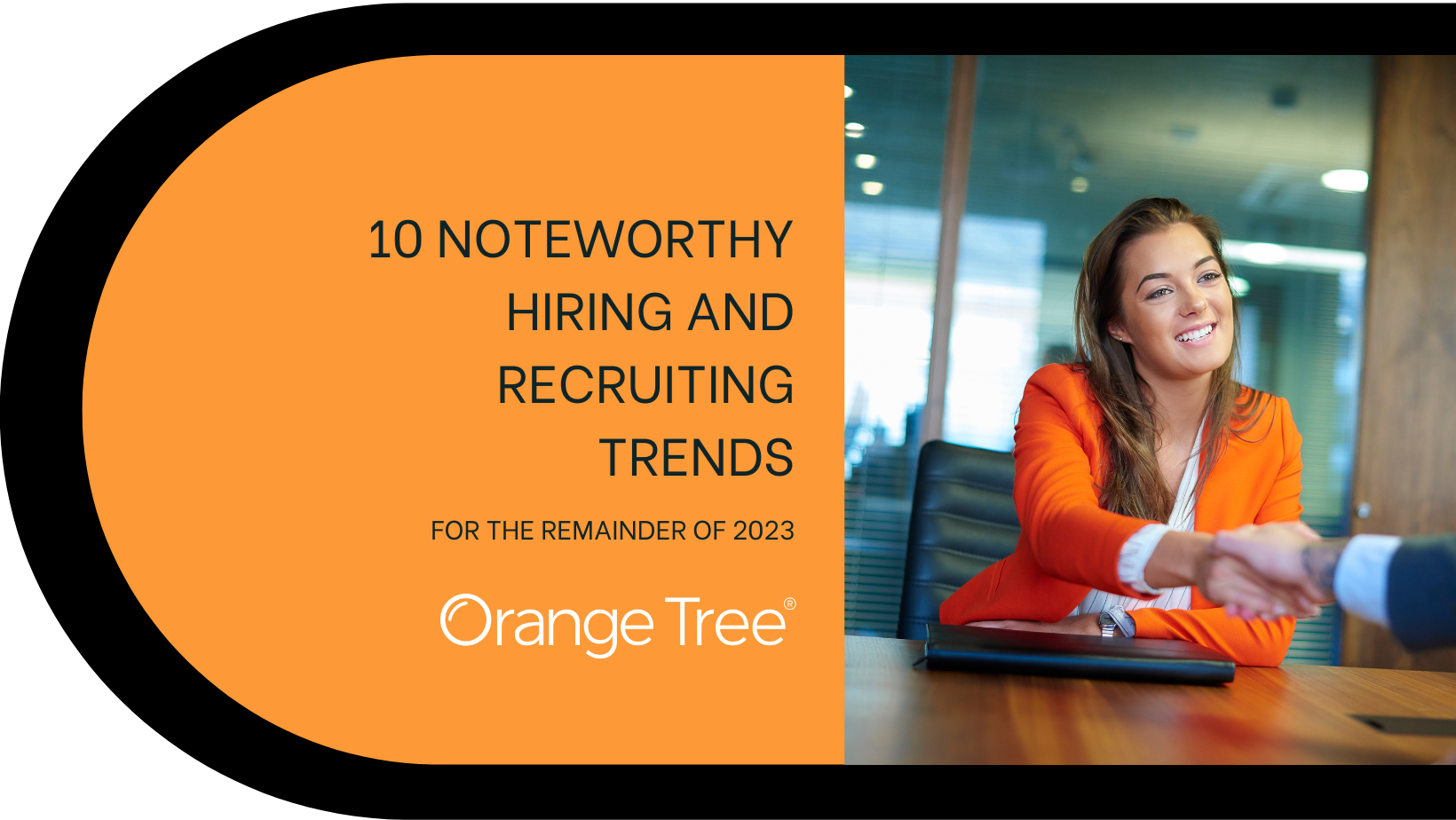Top 10 Background Screening Predictions for 2024
As in most years, navigating the intricate landscape of background checks in 2024 requires diligent...

Employers have faced a recruiting and hiring whirlwind over the past few years, including labor shortages, work-from-home debates, and a red-hot hiring market. While the recruiting and hiring market is finally showing some signs of returning to normalcy during the first half of 2023, it is important for employers to focus on their recruitment game and continue to put their best feet forward.
The traditional working arrangement–spanning the 9 to 5 work week in an office setting–is being put to the test in 2023. Since many job applicants prioritize workplace flexibility above all else (yes, even salary), employers often have no choice but to offer flexible work schedules, remote/hybrid work, shorter work weeks and unlimited vacation time to stay competitive. However, employers are becoming increasingly concerned about workplace cohesiveness, culture, and productivity. As a result, some companies like Apple have issued return to work mandates requiring their employees to work at the office at least a few days each week. There has been a significant pushback on this issue from employees, meaning that the work-from-home debate will likely continue.
The competitive job market is making it difficult for employers to find candidates to fill their open positions. Recruiters and hiring managers are being ghosted from candidates on job interviews and even on first days of work. This challenging and frustrating trend has resulted in decreased hiring numbers and increased compensation packages.
Employer branding, encompassing everything from messaging to social media to job descriptions to networking events, is becoming an increasingly important tool in recruiting and hiring for 2023. Job applicants are not only looking for employers that can offer them the best employment opportunity, but they seek out organizations with certain beliefs and values. In response, employers must step up their game when it comes to communicating their company’s mission, along with the attributes that set them apart from their competitors.
Over the past few years, many states and municipalities have implemented laws requiring employers to include salary ranges in their job listings or at the request of job candidates. The most recent laws were enacted in New York City, New York State, California, Rhode Island, and Washington. This new legislation has had a big impact on the recruitment landscape, particularly on high-wage positions in sectors like technology and healthcare. As the number of salary transparency laws grow, it is becoming increasingly difficult for employers to avoid them. As a result of the new legislation, candidates have more negotiating power and job listings are attracting a higher number of applicants.
Workplace demographics are expected to shift over the next few years as Generation Z enters the workforce. Known as “Gen Z,” this group encompasses people born between 1996 and 2012. While “Gen Zers” currently hold internships and entry-level positions, they are about to take hold of the recruiting and hiring market in a big way, as they are expected to account for over a quarter of the workforce by 2025.
hiring market in a big way, as they are expected to account for over a quarter of the workforce by 2025.
Employers must adjust their hiring and recruiting processes to adapt to this group’s priorities, which include flexible working arrangements and a sense of purpose. It is also important to note that Gen Zers are turned off by outdated recruitment methods, inefficient hiring processes, and clunky background check platforms.
Artificial intelligence (AI) is being widely used in recruiting and hiring to help with things like candidate sourcing, interviewing, hiring decisions and more. Some argue that it’s controversial because it can perpetuate workplace inequalities. Others claim it assists with finding qualified candidates by reducing hiring time and decreasing recruiter workload while eliminating redundant admin asks, all of which enhance the candidate experience. However, make sure to assess all risk involved and do your research before you implement AI programs.
More employers are hiring contract employees for project-based roles, especially those with sought-after skills. While this trend has been around for a few years, the gig economy will likely grow in popularity as workers seek contract roles that offer more flexibility. According to a Forbes article, the gig economy is expected to surpass the regular workforce by 2027. As a result, employers will need to adjust their recruiting and hiring practices to accommodate this key group.
With the rise of remote work, more employees are juggling multiple full-time positions at one time, raising big concerns to potential or current employers. According to a survey from Monster.com, 37 percent of workers reported having more than one full-time job. Orange Tree can help employers with both pre- and post-employment verifications.
While “Candidate Experience” has been a buzz word for many years, the importance of a seamless and positive candidate experience has become increasingly important in today’s competitive hiring market. Employers need to create the best experience possible for their candidates, including seamless technology, a concise job application and an efficient background screening process. Job candidates don’t want to be burdened with cumbersome or slow hiring processes.
The Clean Slate Initiative has been gaining momentum over the past several years with 10 states passing legislation around the issue and numerous jurisdictions looking to follow suit. The Clean Slate Initiative, which seeks to remove the stigma associated with criminal records, has also recently gone to the federal level with The Clean Slate Act being enacted last month.
According to the Clean Slate Initiative, the act is a “first-ever federal process that enables individuals to petition for clearance of non-violent conviction records and establishes a streamlined system to automate sealing for eligible low-level drug records for people who have completed their sentences and remained crime-free for a period of time.” The Fresh Start Act, which was also enacted in April 2023, allows states with sealing laws to apply for federal funds. It is important that employers understand these ever-changing Clean Slate laws and adjust their hiring processes accordingly.
Hiring and recruitment trends are constantly changing so it is crucial that employers remain flexible and adapt to the current trends. At Orange Tree, we believe every company deserves a background screening program designed solely in its best interest. For more information on how Orange Tree can help you in the hiring process, please contact Orange Tree.
Orange Tree Employment Screening helps companies win their race to fill open positions by providing fast and easy background check and drug testing services. We are committed to helping companies create safer workplaces, mitigate financial risk, and avoid legal exposure. We forge long-term partnerships with our clients by offering a full range of technology-led screening solutions predicated on best practice and legally defensible screening programs.